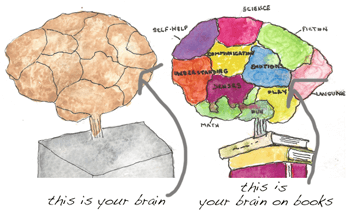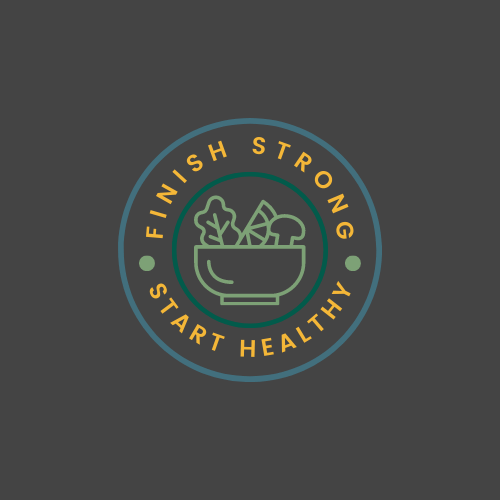I usually read the fine print. Perhaps that comes from my first career as a registered dietitian (R.D.). Dietitians study details on food labels and then advise you, the vulnerable public, what you are and are not supposed to eat. Although you might have noticed that nutrition advice goes in cycles. Eat more carbs and less fat! No, eat more protein and less carbs! Whatever you do, don’t eat eggs! Actually, eggs may be good. Butter is the kiss of death! Wait…no…what you used instead of butter was even worse!

Sorry, I got off topic. I do want to apologize for any confusion you have suffered from changing trends in nutrition advice.
When I started developing Booktalklady, a friend mentioned a New York Times article that said reading fiction improves brain function. What a cool idea! So I read the fine print: not only the excellent column by Annie Murphy Paul in March 2012, but four original sources including my favorite “Short- and Long-Term Effects of a Novel on Connectivity in the Brain”. I was a science major in college so my geeky self often reads original sources. BORING!!! For you, my reader, I will distill science gobbledy-gook down to relevant points.
The study on the effects of reading a novel on brain connectivity was funded by DARPA, part of the Department of Defense. I’m not sure why they funded it, but it’s our tax dollars at work so I thought I’d do a public service and explain it to you. However, in reading it I got bogged down by sentences like “these changes could be segregated into networks associated with short-term changes originating near the left angular gyrus and long-term changes dispersed bilaterally in somatosensory cortex.” It compares MRIs done before and after subjects read Pompeii: A Novel by Richard Harris.
While I was struggling with this I remembered an appointment coming up with a neurologist at a prestigious medical school in Nashville. (Rhymes with canderpilt.) I would ask him to explain the study. He’s a great doctor: super nice, very smart. He uses MRIs all the time. I gave him the paper and waited for his clear explanation. He read it, and paused. “Hmm…” Then he turned to his tablet to Google the big words!
Here are my conclusions about how reading might affect your brain:
• Reading a novel alters brain connections. It may create nerve pathways that make the reader feel like she is actually in the body of the main character.
• People who read mostly fiction score better on tests of empathy and social skill. The personality differences seem to be a result of the reading, and not that empathetic people just happen to prefer fiction.
• Preschool children who have more stories read to them show greater understanding of other people.
Reading is so important that I, The Booktalk Lady, want to help my friends and followers find good books. It’s an extension of my first career as a dietitian, except now I’m focusing on mind food. I believe that reading nourishes mind and spirit. Just as it matters what kind of food you eat, it matters what kind of books you read. Tweet this.
I asked my friend Jane Bondurant to sketch her idea of a “brain on books”, and she created this image of the pleasure and energy we gain from reading. Thank you Jane!

To join the fun, please subscribe to the website www.booktalklady.com by putting your email in the box on the left side of the page, like the Booktalk Lady on Facebook, and the You Tube channel BooktalkladyTV. On Twitter I’m @booktalklady.
Then pull up a chair, sit down and rest a bit, and let a wave of wonderful words wash over you! The Booktalk Lady will help you discover new books, reunite with old favorites, and find words of wisdom to light your life journey.
© 2015 Booktalk Lady LLC




